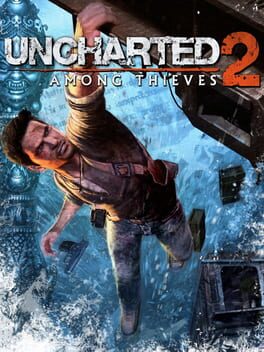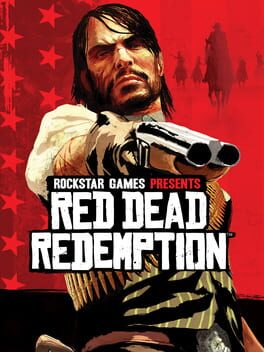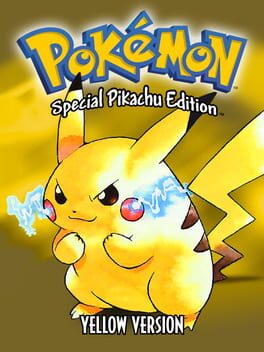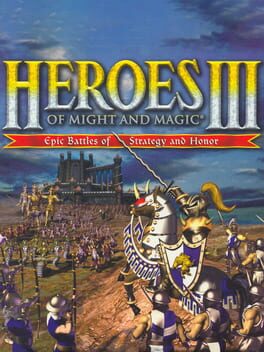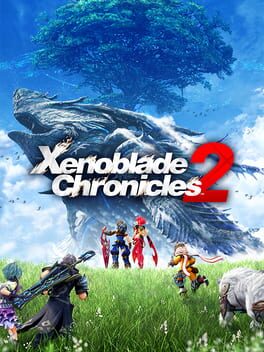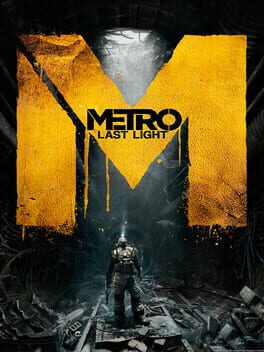RazielRD
Bio
Nothing here!
Badges

Noticed
Gained 3+ followers

GOTY '23
Participated in the 2023 Game of the Year Event

Liked
Gained 10+ total review likes

Shreked
Found the secret ogre page

2 Years of Service
Being part of the Backloggd community for 2 years

GOTY '22
Participated in the 2022 Game of the Year Event
Favorite Games
044
Total Games Played
000
Played in 2024
042
Games Backloggd
Recently Reviewed See More
There are tons of games that demand time. A lot of time. Potentially a dozen hours at the bare minimum before the game finally puts a hand on your shoulder and whispers that it's about to get good. For real, this time. I just finished Super Mario Bros. Wonder and that took me less than 8 hours even after toying around with extra challenges. So when you ask of me to invest over twice of that into a game that is still unwrapping itself, this can be a bit daunting.
Xenoblade 2 can indeed be very daunting. It spans several maps of decent size. It piles one game system upon another even deep into the story. It maintains multiple different types of quests, items and features all at the same time. Its combat system will take multiple hours to unravel and evolve. And its story quite literally takes an entire half to properly come together.
And I also really, really love this game.
Yeah, I don't really have anything to add. Xenoblade Chronicles 2 has plenty of issues - in story, in tone, in presentation and gameplay, and I both understand why some would prefer the first game, while others will be turned off by its pretty poor first impressions. But man once it gets going, it GETS GOING.
Alrest is an absolutely amazing setting filled to the brim with so much variety in its scenery, and its various cultures as well as the political intrigue of its major nations are very compelling. And I love how it builds upon the concept of the first game by expanding on the Titans as gigantic lifeforms that double as quasi-continents. The art direction is superb, very on par with the first game and in my humble opinion sometimes even surpasses it thanks to wider range of environments. And the atmosphere is just perfect, thanks to subtle color changes and an outstanding soundtrack courtesy of Yasunori Mitsuda, ACE, Kenji Hiramatsu and Manami Kiyota.
I know it's controversial, but I also really enjoy the Blade system. Yes, some designs are iffy and the luck aspect of rolling a Rare Blade can get from annoying to frustrating... But they have a good variety, it's fun to mix and match them between different playable characters and their side quests tend to be among the more fun ones in the whole game. I also really enjoy the Merc System, and how it ties to the mercenary camp on Uraya which you can keep investing in and growing.
Like man, I don't know I just love this game so much, warts and all. Its first half is somewhat suffocated by some silly shenanigans and reliance on some annoying tropes, but as it goes on it really unfolds into a pretty massive epic with lovable characters and some hard-hitting drama. The character designs can be a bit much, but the actual artstyle employed to them makes them feel so much more expressive and emotive than in XB1, and I ended up loving all of them because they all felt fleshed-out and went through some interesting development both with their partners and by themselves. I just can't hate Rex, man. Salvager Boy is such a pure cinnamon roll and yet he somehow manages to rizz up at least three superpowered weapon girls with the ability to nuke half the world.
And speaking of characters, Malos and Jin are some of my favorite villains in a game to date. I especially like that they and their team are designed by NEMURA, and the way it plays out makes them feel like you're facing a Final Fantasy protagonist party gone rogue, I wish they had more time to flesh out the other members but it's still such a thrill ride against them. And I find both Jin and Malos to be genuinely intriguing opponents to face, gradually shedding away their archetypical facades to come off as human and even somewhat sympathetic by the end of it.
So yeah, that's some of the things I have to say on Xenoblade 2. It's far from perfect, but I just love it so much. It's absolutely insane this was produced by a core team of 40 people, because there is so much to see here, and so much of it is also surprisingly fleshed-out and given attention to, that I can't help but admire it just as much. If you can look past its slow start and other rough edges, you're in for a treat.
Xenoblade 2 can indeed be very daunting. It spans several maps of decent size. It piles one game system upon another even deep into the story. It maintains multiple different types of quests, items and features all at the same time. Its combat system will take multiple hours to unravel and evolve. And its story quite literally takes an entire half to properly come together.
And I also really, really love this game.
Yeah, I don't really have anything to add. Xenoblade Chronicles 2 has plenty of issues - in story, in tone, in presentation and gameplay, and I both understand why some would prefer the first game, while others will be turned off by its pretty poor first impressions. But man once it gets going, it GETS GOING.
Alrest is an absolutely amazing setting filled to the brim with so much variety in its scenery, and its various cultures as well as the political intrigue of its major nations are very compelling. And I love how it builds upon the concept of the first game by expanding on the Titans as gigantic lifeforms that double as quasi-continents. The art direction is superb, very on par with the first game and in my humble opinion sometimes even surpasses it thanks to wider range of environments. And the atmosphere is just perfect, thanks to subtle color changes and an outstanding soundtrack courtesy of Yasunori Mitsuda, ACE, Kenji Hiramatsu and Manami Kiyota.
I know it's controversial, but I also really enjoy the Blade system. Yes, some designs are iffy and the luck aspect of rolling a Rare Blade can get from annoying to frustrating... But they have a good variety, it's fun to mix and match them between different playable characters and their side quests tend to be among the more fun ones in the whole game. I also really enjoy the Merc System, and how it ties to the mercenary camp on Uraya which you can keep investing in and growing.
Like man, I don't know I just love this game so much, warts and all. Its first half is somewhat suffocated by some silly shenanigans and reliance on some annoying tropes, but as it goes on it really unfolds into a pretty massive epic with lovable characters and some hard-hitting drama. The character designs can be a bit much, but the actual artstyle employed to them makes them feel so much more expressive and emotive than in XB1, and I ended up loving all of them because they all felt fleshed-out and went through some interesting development both with their partners and by themselves. I just can't hate Rex, man. Salvager Boy is such a pure cinnamon roll and yet he somehow manages to rizz up at least three superpowered weapon girls with the ability to nuke half the world.
And speaking of characters, Malos and Jin are some of my favorite villains in a game to date. I especially like that they and their team are designed by NEMURA, and the way it plays out makes them feel like you're facing a Final Fantasy protagonist party gone rogue, I wish they had more time to flesh out the other members but it's still such a thrill ride against them. And I find both Jin and Malos to be genuinely intriguing opponents to face, gradually shedding away their archetypical facades to come off as human and even somewhat sympathetic by the end of it.
So yeah, that's some of the things I have to say on Xenoblade 2. It's far from perfect, but I just love it so much. It's absolutely insane this was produced by a core team of 40 people, because there is so much to see here, and so much of it is also surprisingly fleshed-out and given attention to, that I can't help but admire it just as much. If you can look past its slow start and other rough edges, you're in for a treat.
Despite originating as THE 2D platform game, it's hard not to feel that Mario gradually neglected some of its roots once 3D became the dominant perspective in most high profile games. Mario began to embrace the additional dimension in some of the most creative and enjoyable ways Nintendo could exploit it, but whereas the likes of 64, Sunshine, Galaxy, 3D World and Odyssey all enjoyed careful attention from the Big N, even when Nintendo revived the 2D side under the New Super Mario Bros. label, there was a feeling those didn't get quite the same love and attention as expected from a major Nintendo title.
Super Mario Bros. Wonder, released a whole decade after the last NSMB game, feels like it was designed specifically to address it.
Right from the very beginning the most notable thing you'll notice is how expressive and vivid this game is, especially in comparison to its predecessors. Every level is brimming with dynamic details and bright colors that blend with each other perfectly. Character animations are especially worth of mention with how everything feels so lively and reactive to the rest of the world. Mario slides from one end of the pipe to another and you see him briefly catching his cap before he loses it. Enemies like Goombas keep their eyes on Mario and get frightened if he slams one of them. Background events help adding more depth to the level and it all looks quite pleasant and distinctive. Nintendo cited Wonder as one of its more expensive projects to date, and the results speak for themselves with how beautifully presented the whole package is.
As is the case with a Mario game, it controls borderline perfectly and the mechanics feel tight. The few new transformations added like the elephant fruit are a delight to try out and master, and there are plenty of levels in varying challenges to jump through, using both old enemies and new to keep up the dynamic, evolving feeling of almost each stage.
And of course there is the big standout feature of Wonder, the Wonder flower. The way it bends and twists the backend half of each level is dazzling, from causing a massive stampede of goofy bulls that drag you along to the end, to reviving the skeletons of ancient dragons, to altering Mario's very foundation as he needs to overcome familiar obstacles in new ways. The Wonder Flower is, for the most part, a very fun addition. Although it perhaps also the poster child of Wonder's biggest issues.
Listen, this game is great. Sometimes it's even amazing. It looks as good as a 3D Mario game and it plays tight and fast with plenty of goodies to unlock. It's a Mario game, after all. There is a certain level of quality it is expected to hit, and it certainly delivers on that.
But remember me saying this game felt >specifically designed< to address many of its predecessors' problems? Yeah, as good as Mario Wonder is, it can never escape the feeling that its constant attempts to surprise and delight end up feeling somewhat ingenuine and predictable.
And that's fine, Wonder is by no means a bad or uncreative game. Far from it. But as the game goes on I can't help but feel it didn't quite learn all the lessons its predecessors had to go through. At some point the Wonder effects become less inventive and more... expected. To the point sometimes I'd just go look for them to be done with it rather than actively anticipating them falling to my hands. And ultimately, for all of its attempts to surprise players, it ends up being a fairly 'conventional' release by the end.
And then there are issues that go beyond that, like the fact that aside from the final boss, all boss fights are the same enemy just with some slight changes. For a game drumming up how unique and varied it is, this is a rather disappointing aspect, which in itself fairly surprising so I guess Nintendo did surprise me on one level.
It may sound like I hate this game or not too big on it, but I really did have a lot of fun with Mario Wonder. Perhaps that's all that counts? But for a game acclaimed as a return to form to Mario's 2D roots... It's not quite what one would expect from it. At least in my opinion.
Super Mario Bros. Wonder IS a step in the right direction, and I think it's easily among Mario's best 2D outings. But just like Mercurysteam's Metroid: Dread, it still feels like trying to catch up with the 3D side. SMB Wonder has far more personality than any of its 'modern' predecessors, that's true. But Nintendo still has quite some length to go until this sub-series can match the same charisma and richness as its counterparts, or Donkey Kong Country's level for that matter. The big gorilla's outings still reign as some of the greatest in the genre, from storytelling to art to level design to the entire package. And I can't imagine Mario letting one of his most iconic rivals to one-up him there, right?
But yes, I probably should repeat, for all my issues with Wonder, it's a damn good game, and hopefully it will pave the way for even grander and better successor that will keep pushing Mario to his absolute limits.
Super Mario Bros. Wonder, released a whole decade after the last NSMB game, feels like it was designed specifically to address it.
Right from the very beginning the most notable thing you'll notice is how expressive and vivid this game is, especially in comparison to its predecessors. Every level is brimming with dynamic details and bright colors that blend with each other perfectly. Character animations are especially worth of mention with how everything feels so lively and reactive to the rest of the world. Mario slides from one end of the pipe to another and you see him briefly catching his cap before he loses it. Enemies like Goombas keep their eyes on Mario and get frightened if he slams one of them. Background events help adding more depth to the level and it all looks quite pleasant and distinctive. Nintendo cited Wonder as one of its more expensive projects to date, and the results speak for themselves with how beautifully presented the whole package is.
As is the case with a Mario game, it controls borderline perfectly and the mechanics feel tight. The few new transformations added like the elephant fruit are a delight to try out and master, and there are plenty of levels in varying challenges to jump through, using both old enemies and new to keep up the dynamic, evolving feeling of almost each stage.
And of course there is the big standout feature of Wonder, the Wonder flower. The way it bends and twists the backend half of each level is dazzling, from causing a massive stampede of goofy bulls that drag you along to the end, to reviving the skeletons of ancient dragons, to altering Mario's very foundation as he needs to overcome familiar obstacles in new ways. The Wonder Flower is, for the most part, a very fun addition. Although it perhaps also the poster child of Wonder's biggest issues.
Listen, this game is great. Sometimes it's even amazing. It looks as good as a 3D Mario game and it plays tight and fast with plenty of goodies to unlock. It's a Mario game, after all. There is a certain level of quality it is expected to hit, and it certainly delivers on that.
But remember me saying this game felt >specifically designed< to address many of its predecessors' problems? Yeah, as good as Mario Wonder is, it can never escape the feeling that its constant attempts to surprise and delight end up feeling somewhat ingenuine and predictable.
And that's fine, Wonder is by no means a bad or uncreative game. Far from it. But as the game goes on I can't help but feel it didn't quite learn all the lessons its predecessors had to go through. At some point the Wonder effects become less inventive and more... expected. To the point sometimes I'd just go look for them to be done with it rather than actively anticipating them falling to my hands. And ultimately, for all of its attempts to surprise players, it ends up being a fairly 'conventional' release by the end.
And then there are issues that go beyond that, like the fact that aside from the final boss, all boss fights are the same enemy just with some slight changes. For a game drumming up how unique and varied it is, this is a rather disappointing aspect, which in itself fairly surprising so I guess Nintendo did surprise me on one level.
It may sound like I hate this game or not too big on it, but I really did have a lot of fun with Mario Wonder. Perhaps that's all that counts? But for a game acclaimed as a return to form to Mario's 2D roots... It's not quite what one would expect from it. At least in my opinion.
Super Mario Bros. Wonder IS a step in the right direction, and I think it's easily among Mario's best 2D outings. But just like Mercurysteam's Metroid: Dread, it still feels like trying to catch up with the 3D side. SMB Wonder has far more personality than any of its 'modern' predecessors, that's true. But Nintendo still has quite some length to go until this sub-series can match the same charisma and richness as its counterparts, or Donkey Kong Country's level for that matter. The big gorilla's outings still reign as some of the greatest in the genre, from storytelling to art to level design to the entire package. And I can't imagine Mario letting one of his most iconic rivals to one-up him there, right?
But yes, I probably should repeat, for all my issues with Wonder, it's a damn good game, and hopefully it will pave the way for even grander and better successor that will keep pushing Mario to his absolute limits.
As a sequel, Metro: Last Light is undeniably a fascinating one. It's certainly more polished than 2033, while delivering some subtle improvements and modifications to the stealth-horror-action formula. It's absolutely gorgeous, maintaining the combination of creepiness and poignance through its environments, atmosphere and lighting. And it further expands the world of Metro with striking moments and world-building.
At the same time, in the three years since 4A Games unleashed Metro 2033 upon the world, I feel like they took some wrong lessons from contemporary AAA titles. Metro: Last Light is a good game, but as it edges closer to some of the trends that began to pop up around 2033's release, I can't help but feel a little conflicted.
Everything good about 2033 is still here, though. Last Light is a wholly atmospheric affair with intense action and claustrophobic dread. The guns work just as good if not better, and stealth has been further refined with better utilization of its lighting mechanic. Level design has also improved considerably, with even more elaborate stages and even a tiny bit more exploration for resources and other secrets.
Many of the small touches that made 2033 so personal and lifelike are also still here. Artyom's mask will shatter if he takes too much damage in radioactive areas, and he needs to replace it alongside more oxygen when the time necessitates it. You can also clean your visor when it's dirty, and light up your match to burn spider webs or scare off certain enemies. It's those little elements that make the survival feel all the more real. There's nothing new here that wasn't in 2033, but it's all done so well.
At the same time, it's clear 4A or whoever paying for them got some cold feet about 2033's more unforgiving (if still far more manageable than, say, STALKER) nature. It's already evident when you're allowed to pick between a more survival-focused difficulty and a more action-oriented one. Nothing wrong with it, before I continue. I think it's always great to give more options to players. But this does give us the first indication that Last Light's development was partly driven by making it a more 'marketable' title.
There is more affinity for set-pieces here, a little more explosions in the road. The story is more straightforward in its presentation. It's certainly more chatty than 2033. About 80% of the campaign is actually spent being with an ally NPC by your side. Not a bad thing necessarily, but some of the horror and animosity of the setting does lose a bit of itself in the process. The game is also a lot more blatant in other ways of keeping players engaged. There are some eye-candy moments in the game, you can even take a lap dance lol. Games are allowed to have some fun in them, but in Last Light's case this comes off as more forceful and juvenile in comparison to the rest of the game.
And as well all know, survival-horror games can't do boss fights well. FPSs also can't do boss fights well. And as a survival-horror shooter, Last Light has a few of them. There is some great build-up to some of them, but the end result is all the same. It's rather meandering and clunky; neither the arenas nor Artyom's controls are too suited for such encounters. And I'd much rather those times to have been spent on more exciting combat arenas or horror sections that allow better use of Artyom's abilities.
As far as the story goes, it's decent. The environments tell the narrative much better than the actually spoken dialogue, but the overall story arc of Artyom seeking either redemption or damnation for his actions in the previous game is compelling and touching enough to work. Of particular note, Artyom's visits to mass graves of damned souls are especially memorable and haunting.
Well, that's Metro: Last Light. I do like this game. A lot. In some aspects it a much improved successor to 2033. At the same time, it willingly falls into trappings of then-modern trends that its predecessors wisely ignored or remained ignorant of. Either way, this only makes Last Light more fascinating as a video game, and it still accomplishes some of its lofty ambitions to present a truly harrowing yet hopeful tale of redemption even when the world around of you dies. So how can I hate it?
At the same time, in the three years since 4A Games unleashed Metro 2033 upon the world, I feel like they took some wrong lessons from contemporary AAA titles. Metro: Last Light is a good game, but as it edges closer to some of the trends that began to pop up around 2033's release, I can't help but feel a little conflicted.
Everything good about 2033 is still here, though. Last Light is a wholly atmospheric affair with intense action and claustrophobic dread. The guns work just as good if not better, and stealth has been further refined with better utilization of its lighting mechanic. Level design has also improved considerably, with even more elaborate stages and even a tiny bit more exploration for resources and other secrets.
Many of the small touches that made 2033 so personal and lifelike are also still here. Artyom's mask will shatter if he takes too much damage in radioactive areas, and he needs to replace it alongside more oxygen when the time necessitates it. You can also clean your visor when it's dirty, and light up your match to burn spider webs or scare off certain enemies. It's those little elements that make the survival feel all the more real. There's nothing new here that wasn't in 2033, but it's all done so well.
At the same time, it's clear 4A or whoever paying for them got some cold feet about 2033's more unforgiving (if still far more manageable than, say, STALKER) nature. It's already evident when you're allowed to pick between a more survival-focused difficulty and a more action-oriented one. Nothing wrong with it, before I continue. I think it's always great to give more options to players. But this does give us the first indication that Last Light's development was partly driven by making it a more 'marketable' title.
There is more affinity for set-pieces here, a little more explosions in the road. The story is more straightforward in its presentation. It's certainly more chatty than 2033. About 80% of the campaign is actually spent being with an ally NPC by your side. Not a bad thing necessarily, but some of the horror and animosity of the setting does lose a bit of itself in the process. The game is also a lot more blatant in other ways of keeping players engaged. There are some eye-candy moments in the game, you can even take a lap dance lol. Games are allowed to have some fun in them, but in Last Light's case this comes off as more forceful and juvenile in comparison to the rest of the game.
And as well all know, survival-horror games can't do boss fights well. FPSs also can't do boss fights well. And as a survival-horror shooter, Last Light has a few of them. There is some great build-up to some of them, but the end result is all the same. It's rather meandering and clunky; neither the arenas nor Artyom's controls are too suited for such encounters. And I'd much rather those times to have been spent on more exciting combat arenas or horror sections that allow better use of Artyom's abilities.
As far as the story goes, it's decent. The environments tell the narrative much better than the actually spoken dialogue, but the overall story arc of Artyom seeking either redemption or damnation for his actions in the previous game is compelling and touching enough to work. Of particular note, Artyom's visits to mass graves of damned souls are especially memorable and haunting.
Well, that's Metro: Last Light. I do like this game. A lot. In some aspects it a much improved successor to 2033. At the same time, it willingly falls into trappings of then-modern trends that its predecessors wisely ignored or remained ignorant of. Either way, this only makes Last Light more fascinating as a video game, and it still accomplishes some of its lofty ambitions to present a truly harrowing yet hopeful tale of redemption even when the world around of you dies. So how can I hate it?

